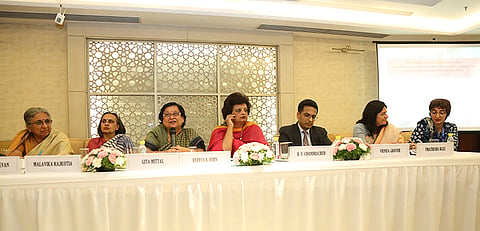

[dropcap]J[/dropcap]indal Global Law School in collaboration with National Law University, Delhi and Ambedkar University hosted a panel on "Feminism in Practice: Feminist Lawyering and Feminist Judging" as a part of the Indian Feminist Judgment Re-writing Project.
The roundtable panel which consisted of J&K High Court Chief Justice Gita Mittal, former Madras High Court judge Justice Prabha Sridevan, Supreme Court judge Justice D.Y Chandrachud, Advocates Malavika Rajakotia and Vrinda Grover and academician Pratiksha Baxi was moderated by Senior Advocate Rebecca John.
The discussion began with Justice Chandrachud reflecting on the transformative potential of the Indian Constitution. Stating that the constitution is a feminist document, Justice Chandrachud said, "feminism is a lot about disruption of social hierarchies and that is what the constitution intends to do. Transformation involves a disruption of the existing social structures."
In response to the question of what feminist judging constitutes, Justice Gita Mittal expressed feminist judging to her was about women's access to justice. She spoke about the limitations women face irrespective of their backgrounds while seeking legal redress. She stated that some of the major barriers that a woman faces are often her family and friends who dissuade her from reaching out for help. She expressed that access to justice is not synonymous to access to courts.
Former Madras High Court Justice Prabha Sridevan who was the first judge in India to economically quantify household labour, spoke about the importance of judges being pragmatic while deciding matters before them. She also spoke about the difficulties women lawyers face while attempting to reach the bench from the bar. She pointed out that unless the lawyer is fortunate enough to practice before the Chief Justice of a High Court, she will not be recognised.
Advocate Vrinda Grover vocalized the need to have diversity on the bench. She elaborated that the bench must consist of individuals with diverse opinions and perspectives. She highlighted the need to not only re-invent substantive law but also procedural aspects of the law such as appointment processes, court room practices and the nature of arguments. She spoke of the need to engender processes.
Advocate Malavika Rajkotia articulated how judges are often victims of their own socialisation. She expressed the need for the judiciary to recognise the limitations of the same and attempt to transcend it.
Academician Pratiksha Baxi emphasized the urgency of archiving the feminist bar and bench. She stated feminist writing is not merely restricted to the bench but also extends to other legal institutions such as the police, medico-legal professionals and officers of the court.
The engaging session was attended by a diverse crowd consisting of legal practitioners, feminist scholars, activists and students. The discussions addressed several other issues on feminist lawyering and judging that currently plague the legal field.